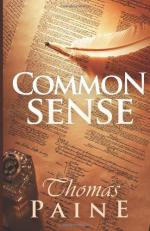Some writers have explained the English constitution thus: The king, say they, is one, the people another; the peers are a house in behalf of the king, the commons in behalf of the people; but this hath all the distinctions of a house divided against itself; and though the expressions be pleasantly arranged, yet when examined, they appear idle and ambiguous; and it will always happen, that the nicest construction that words are capable of, when applied to the description of some thing which either cannot exist, or is too incomprehensible to be within the compass of description, will be words of sound only, and though they may amuse the ear, they cannot inform the mind, for this explanation includes a previous question, viz. how came the king by A power which the people are afraid to trust, and always obliged to check? Such a power could not be the gift of a wise people, neither can any power, which needs checking, be from God; yet the provision, which the constitution makes, supposes such a power to exist.
But the provision is unequal to the task; the means either cannot or will not accomplish the end, and the whole affair is a felo de se; for as the greater weight will always carry up the less, and as all the wheels of a machine are put in motion by one, it only remains to know which power in the constitution has the most weight, for that will govern; and though the others, or a part of them, may clog, or, as the phrase is, check the rapidity of its motion, yet so long as they cannot stop it, their endeavours will be ineffectual; the first moving power will at last have its way, and what it wants in speed, is supplied by time.
That the crown is this overbearing part in the English constitution, needs not be mentioned, and that it derives its whole consequence merely from being the giver of places and pensions, is self-evident, wherefore, though we have been wise enough to shut and lock a door against absolute monarchy, we at the same time have been foolish enough to put the crown in possession of the key.
The prejudice of Englishmen in favour of their own government by king, lords, and commons, arises as much or more from national pride than reason. Individuals are undoubtedly safer in England than in some other countries, but the will of the king is as much the law of the land in Britain as in France, with this difference, that instead of proceeding directly from his mouth, it is handed to the people under the more formidable shape of an act of parliament. For the fate of Charles the First hath only made kings more subtle—not more just.
Wherefore, laying aside all national pride and prejudice in favour of modes and forms, the plain truth is, that it is wholly owing to the constitution of the people, and not to the constitution of the government, that the crown is not as oppressive in England as in Turkey.




